ADB Provides Landmark Assistance to Cambodia’s Marine Fisheries Sector
The Asian Development Bank (ADB) has approved a $73 million financing package to boost the climate resilience and sustainability of coastal and marine fisheries in Cambodia.
The Greater Mekong Subregion is working to improve the quality of life and economic vibrancy of its cities and towns by using global best practices in urban development.
The Urban Development Working Group oversees urban development and economic zones as new areas of cooperation in the subregion.
By 2050, the Greater Mekong Subregion is expected to be at least 50% urbanized. This will bring vast changes to the economies of the subregion. What was once a primarily agricultural area is transforming into a place where cities and towns are the main drivers of economic growth. Careful planning is needed to balance urban growth with environmental protection and economic equity so that healthy cities can be enjoyed by all residents.
The Greater Mekong Subregion is working to improve the quality of life and economic vibrancy of its cities through the development of national strategies and projects that incorporate global best practices into the subregion’s urban development. This work has included the first and second Corridor Towns Development Project, which is developing competitive and environmentally friendly cities along vital economic arteries in the subregion. Cross-border economic zones are also being developed.
The COVID-19 pandemic inevitably will leave its mark on cities, physically and socially, echoing for generations to come. This is already evident in terms of urban life. The GMS Program will focus on these effects with measures to respond to current and future crises. The GMS Economic Cooperation Program Strategic Framework 2030 (GMS-2030) will encourage a holistic approach to the future planning of cities so that they are green, smart, competitive, resilient, safe, and inclusive. It will also promote linkages between cities to develop new urban clusters and maximize economies of agglomeration, develop cities in border areas, create linkages with special economic and industrial zones, and improve waste management and pollution in cities located close to GMS rivers and seas. GMS-2030 was endorsed and adopted at the 7th GMS Summit of Leaders in September 2021. It aims to provide a new setting for the development of this subregion for the next decade.
Related
• Urban Development in the Greater Mekong Subregion
• Greater Mekong Subregion Urban Development Strategic Framework
• Second Greater Mekong Subregion Corridor Towns Development Project
• Urban Development Working Group
Focal Persons at the Asian Development Bank
Alan Baird
Water and Urban Development Sector Office Sectors Group
Other Concerned Staff & Consultants
Antonio Ressano
Regional Cooperation and Integration Unit
Southeast Asia Department
Alma Canarejo
Regional Cooperation and Integration Unit
Southeast Asia Department/GMS Secretariat
Send inquiries to GMS Secretariat.
The Asian Development Bank (ADB) has approved a $73 million financing package to boost the climate resilience and sustainability of coastal and marine fisheries in Cambodia.
The Department of Public Works and Transport of the Lao People’s Democratic Republic (PDR), and Supthavy Construction Maintenance Complete Sole Ltd. signed an agreement for the fourth Greater Mekong Subregion (GMS) Corridor Towns Development Project. Mr. Khouanta Douanglaty, department director, and Ms. Chinadavone Siritham, President, Supthavy Construction led the signing.
The Asian Development Bank (ADB) has approved a $140 million loan to improve the environmental and economic conditions in Guilin in the Guangxi Zhuang Autonomous Region of the People’s Republic of China.
“Rapid urbanization has become a threat to Guilin's natural resources and sustainable development,” said ADB Senior Transport Specialist for East Asia Nicolas Dei Castelli. “This project will include a number of innovative solutions with demonstration potential, including low-carbon mobility, inclusive sanitation, and institutional development.”
The recently-concluded Subregional Transport Forum (STF-25) of the GMS Program highlighted the importance of behavioral interventions and stakeholders’ involvement to the reduction of road crashes and fatalities in the subregion. STF has been providing assistance in improving road safety for GMS countries since 2011.
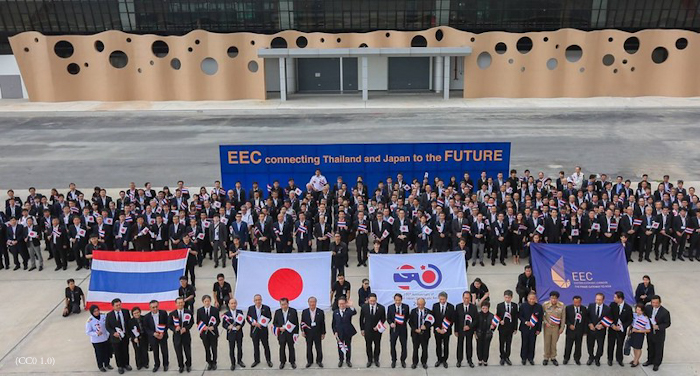
Site visit of Japanese investors to U-Tapao International Airport in September 2017. Photo via Flickr.
Thailand will develop a new smart city in Bang Lamung district, Chon Buri, Thailand. The development is part of the country’s Eastern Economic Corridor (EEC) and will be located 15 kilometers from U-Tapao Airport.
Mr. Kanit Sangsubhan, secretary-general of the EEC Office, estimates that the new smart city will draw 1.34 trillion baht's worth of investment over 10 years and create 200,000 new jobs.

ADB supports Thailand in responding to the health, social, and economic impacts of the COVID-19 pandemic. In 2021, ADB provided $1.5 billion loan to help the country mitigate the negative economic impact of the pandemic.
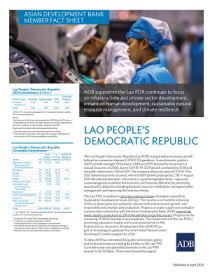
ADB is one of Lao PDR's largest sources of official development assistance, with an average annual lending of $100 million over the 5 years to 2021.
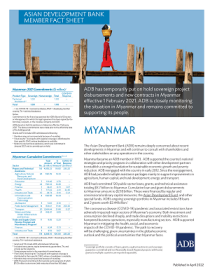
ADB remains deeply concerned about recent developments in Myanmar and will continue to consult with shareholders and other stakeholders on any operations in the country.
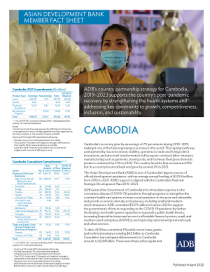
ADB is one of Cambodia's largest sources of official development assistance, with average annual lending of $329.8 million from 2016-2021. The bank's support is aligned with the Cambodia's National Strategic Development Plan 2019-2023.
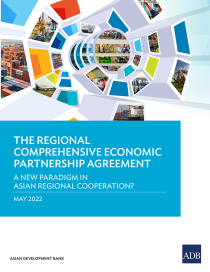
This report compares the Regional Comprehensive Economic Partnership (RCEP) with other free trade agreements and suggests how policy makers can promote its successful implementation.